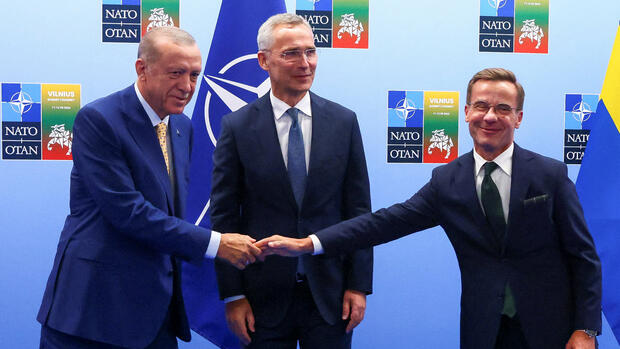Erdogan agreed to present the accession protocol to the Turkish parliament as quickly as possible, said Stoltenberg, speaking of a “historic day”.
After the start of the Russian war of aggression against Ukraine, Sweden and Finland applied to join the military alliance. However, Turkey delayed ratification, arguing that Sweden was harboring terrorists from the Kurdish Workers’ Party PKK. Sweden then tightened its laws and even decided to change the constitution.
But Turkey continued to be dissatisfied. The burning of the Koran by Swedish opponents of Islam further exacerbated tensions. The situation seemed hopeless.
Then, on Monday, things took a turn for the worse. First, Erdogan surprised the allies by tying his country’s approval of Sweden’s accession to the process for Turkey’s EU accession.
Departure from Berlin
Chancellor Olaf Scholz reacted quickly with a rebuff: Sweden’s NATO membership and Turkey’s EU accession were not related, he said in Berlin.
But top EU officials were more cautious. About Council President Charles Michel: The Belgian promised the Turkish President to look for ways to “revitalize” relations between the European Union and Turkey.
Unlike Scholz, Michel underlined the European interest in improving the tense relationship with Turkey. Without making any concessions in terms of content, he gave Erdogan the opportunity to solve his blockade while saving face.
It is now clear that Turkey was also looking for a way out – because it was almost completely isolated within NATO. Last week, anger erupted at the Alliance’s Brussels headquarters at Erdogan’s tactics. Turkey would object “to anything,” it said.
Erdogan apparently wanted the big entrance
Some NATO diplomats already suspected at the weekend that Erdogan would loosen the blockade at the summit: the Turkish president wants to make a grand entrance, he loves the limelight.
In fact, Erdogan’s yes to Sweden joining NATO is part of a larger maneuver since his election victory on May 28. He has apparently rediscovered the West for himself and is now moving towards his old partners politically.
The motives for Erdogan’s change are manifold: the Turkish economy needs money to finance its chronically high budget and trade deficit. President Erdogan has brought a new finance minister on board. Both are scheduled to fly to the Arabian Peninsula in mid-July to attract investors. However, that will not be enough – because Turkey’s largest trading partners are still in Europe.
The Turkish President has a variety of motives for his rapprochement with the West.
(Photo: Getty Images)
In addition, the neutral stance towards Russia is no longer worthwhile for Turkey. The government in Ankara is still not participating in Western sanctions against Russia and was thus able to channel a good part of Russian foreign trade via Turkey, especially in the first year of the war, and thus benefit economically.
But now the USA and the EU are increasing the pressure on the issue of circumventing sanctions. According to information from the Handelsblatt, the EU is sending Finance Commissioner Mairead McGuinness to the Bosphorus this week.
Putin has made himself dependent on Erdogan
Erdogan, on the other hand, now has several levers in his hand against Putin. The Kremlin boss has been weakened since the Wagner uprising, and Erdogan has taken advantage of this situation. The Turkish President received the Ukrainian head of state Volodymyr Zelenskiy on Friday and promised him help with Ukraine’s NATO accession. Both countries also want to cooperate in drone production.
The Presidents of Turkey and Ukraine met at the weekend.
(Photo: AP)
In addition, Erdogan released six Ukrainian prisoners of war who were supposed to remain in exile in Turkey until the end of the war. The Kremlin protested sharply, but could do nothing apart from harsh statements. Putin has made himself dependent on Turkey for trade, tourism and political initiatives such as the grain deal brokered by Turkey.
Erdogan has strengthened his own position with this independent Russia doctrine for a year and a half. He uses that now.
Even during the election campaign, Erdogan had refrained from rhetorical hostility towards the West or Europe. Erdogan has almost completely replaced his old cabinet, which consisted of hardliners in key departments.
The former head of the secret service is now foreign minister, and a former general is the new defense minister. The new energy minister is also considered to be pragmatic, while there had previously been a lot of disputes between Turkey and the EU, especially on the subject of energy. Now the signs point to cooperation. Talks about rapprochement are underway with arch-enemy Armenia, as well as with Egypt and EU member Greece.
It is not yet clear when Sweden will actually join NATO. Stoltenberg said he would not give specific dates, but said it was a “clear commitment.” The Turkish parliament must announce the exact date. In addition to Turkey, Hungary also has to agree to Sweden’s request, but the government there has not signaled any fundamental concerns, which is why NATO is not expecting any further blockades.
More: How Biden and Scholz want to comfort Ukraine at the NATO summit
